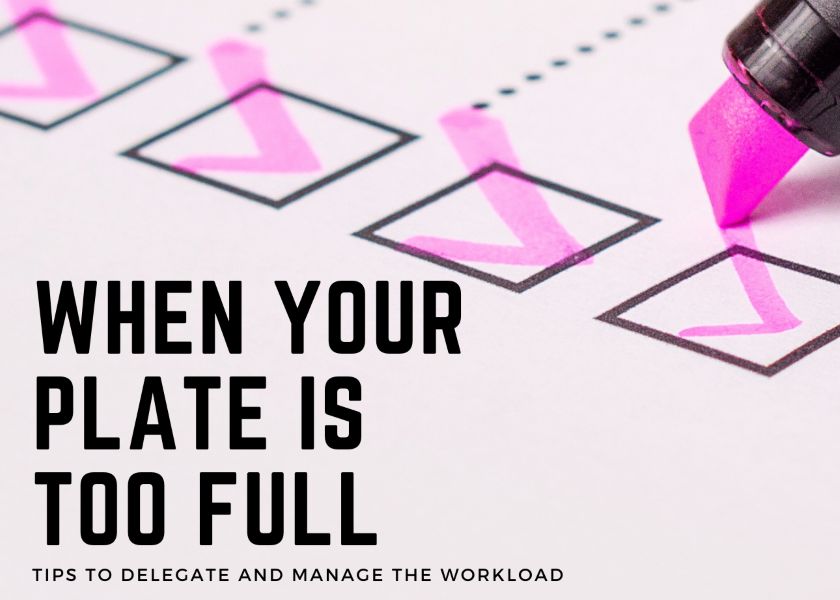When Your Plate Is Too Full: Tips to Delegate and Manage the Workload

Do you ever feel overwhelmed, overloaded, scattered?
“Generally, pandemic or not, leaders feel at least a little bit this way all the time,” says Marlene Eick, a leadership coach and consultant from Wooster, Ohio. “The question is, is this ok? And if not, what can we do about it?”
Eick says delegating is helpful to any leader and can help solve those feelings of being overwhelmed, overloaded and scattered.
Why Don’t We Delegate?
Three obstacles stand in the way of leaders delegating tasks, Eick explains.
1. You think you're the only person who can do it.
This is a tough one, especially if you are a business owner, she says. People often struggle with the idea that someone else could have as much passion as they have for the business.
“If we are leaders in our field, we've likely gotten to this place of leadership by being a person who does things. You've probably worked independently, too. Now you're at this place where you've got all kinds of things on your plate,” Eick says. “Even though you have a team of people, assistants, contractors, industry partners, etc., and could be delegating some of this work, you might still be operating from that mindset of ‘I have to be the one to do this.’”
2. You haven’t identified and trained anyone else.
Training people to do parts of your job requires focused investment and time. Simply put, it takes a lot of work. In the short-term, that may be true, but Eick says in the long-term, that investment will pay off.
“Take the time right now to identify who on our team could do the job,” she says. “If we identify that person and train them, we know that saves us time. But this can definitely be an obstacle if we haven't done that yet.”
3. You haven’t created a process for delegation.
Once you’ve shifted your mindset to accept someone else could do some of this work and you’ve identified and trained that person, you need to have a process in place to shift work to them at appropriate times.
Challenges may include not having a standing meeting with someone on your team or poor regular channels of communication to share tasks with someone, she says.
How Can We Get More Off Our Plate?
Taking more off your plate starts with shifting your mindset and asking the hard questions, Eick says.
1. What can someone else do?
Take an inventory of everything that is on your plate. Consider what tasks could be shared or outsourced to someone else. Eick says it is important to consider your personal tasks, too.
“We can often lighten the load of all the things we have to do by thinking what about what we can delegate in our personal life to make space for those professional tasks or projects we have going on,” she says.
2. Who can do it?
Eick says determining who could take on some of your tasks is an important question – but not an excuse to get out of doing things in your job description. Based on the tasks at hand, who are you looking for? Someone who has entry-level skills? A high schooler? A new college graduate? Or do you need a skilled and talented contractor to come in and help with a project?
“Being very clear about what you need is critical,” she says. “And make sure you train or instruct them accordingly.”
3. How can you get work to them?
Determine a process that will allow you to share tasks easily. Some ideas to consider are a daily e-mail, a morning phone call or a Slack channel for discussions.
“Find the right way to regularly communicate because no one can read your mind,” Eick says. “They want to help you, but they can’t know what you need unless you are communicating that to them.”
Delegating tasks starts with one tiny step forward, she says. It also requires a willingness to share the workload.
“No matter where we are in our careers, if no one before us had ever thought, ‘I'm not the only person who could do this,’ none of us would have gotten an opportunity,” Eick says.
Read More:







